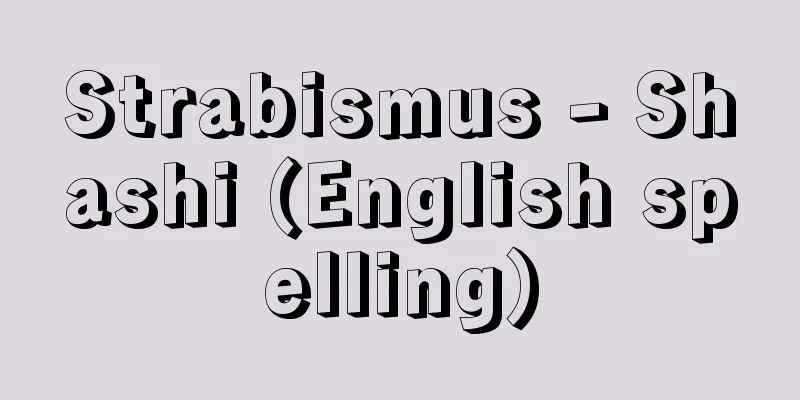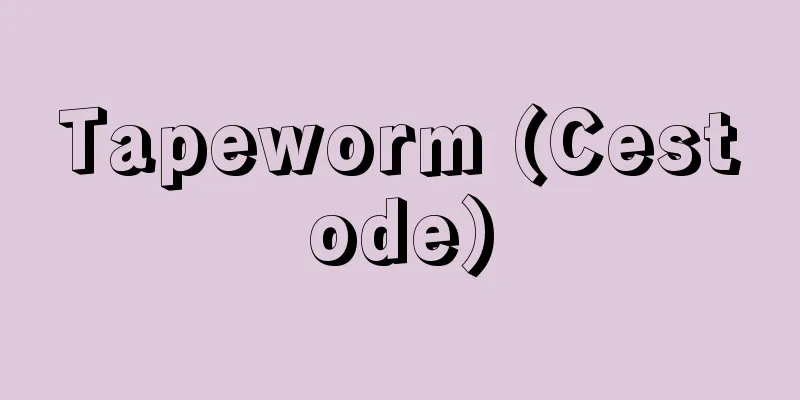Monody (English spelling) monody English

|
A term relating to a style of Western music. A compound word of the Greek words monos (single) and ode (song), it generally refers to vocal music consisting of a single voice. It is considered a type of homophony, as it is usually accompanied by a chordal accompaniment on a lute or keyboard instrument. In the narrower sense, it is used to refer to a style of solo music that developed in Italy around 1600 as a reaction to the polyphonic style. Today, the term monody is usually used in the narrower sense. At the end of the 16th century, the Florentine Camerata (a group of scholars and musicians from the Bardi family) was trying to revive classical Greek drama, and monody was formed based on that idea. Here, the lyrics were required to be sung with high expressiveness and dramatic quality, and the melody was in the style of recitative, supported by a chord-like accompaniment from a basso continuo. The most famous early monodys are Caccini's "Nouveau Musica" (first edition 1601) and the oldest surviving opera, "Euridice" (composed by Peri, premiered in 1600, with some parts composed by Caccini). After that, this style quickly spread to all kinds of music, and in instrumental music it promoted the creation of the solo sonata. However, it declined after the 1630s with the development of vocal and instrumental expressions. [Toshiaki Kurosaka] [Reference] | |Source: Shogakukan Encyclopedia Nipponica About Encyclopedia Nipponica Information | Legend |
|
西洋音楽の様式に関する用語。ギリシア語monos(単一)とode(歌)との合成語で、広義には単一声部からなる声楽曲をさす。これは通常リュートや鍵盤(けんばん)楽器による和弦的伴奏に伴われることが多いため、ホモフォニーの一種とみなされる。狭義には、1600年ごろ、ポリフォニー様式の反動としてイタリアで発展した独唱音楽の様式に対して用いられる。今日、単にモノディといえば、狭義の意味で用いるのが普通である。 16世紀の末、フィレンツェのカメラータ(バルディ家の学者や音楽家たちの集団)の間では古典ギリシア劇の再興が企てられていたが、モノディはその理念に端を発し、形成された。ここでは歌われる歌詞が高い表現力や劇性をもって一語一語克明に表現されることが求められ、旋律は通奏低音楽器の和弦的伴奏に支えられたレチタティーボ風なものとなっている。初期のモノディのもっとも有名なものには、カッチーニの『新音楽』(初版1601)や、現存最古のオペラ『エウリディーチェ』(ペーリ作曲、1600初演。一部はカッチーニ作曲)があげられる。その後、この様式はあらゆる音楽に急速に浸透し、器楽面では独奏ソナタの成立を促した。しかし、声楽や器楽固有の表現法の開発とともに、1630年代を境に衰退した。 [黒坂俊昭] [参照項目] | |出典 小学館 日本大百科全書(ニッポニカ)日本大百科全書(ニッポニカ)について 情報 | 凡例 |
<<: Mono no aware - Mono no aware
>>: Monotis (English spelling)
Recommend
Self-assessment - self-assessment
A method in which taxpayers pay taxes based on ta...
Shikshim
…The remains of a cluster of Buddhist temples are...
Ida - Ida
→ Japanese dace Source: Shogakukan Encyclopedia N...
Positive image
〘 noun 〙 A photograph in which the hues and light ...
Wong Poon Muang - Wong Poon Muang
...Other ethnic minorities, such as the Miao, Kar...
Hyperopic astigmatism
…If both are myopic, it is called myopic compound...
Betti number (English spelling)
...A closed curve c on a genus 2 closed surface (...
Government Standards - Public Standards
… Standards can also be classified according to t...
Heron
[1] (noun) ① A general term for birds belonging to...
Isoda Lake Ryusai
Dates of birth and death unknown. Ukiyo-e artist ...
Headless - Batou
The title of a Gagaku piece. It can also be writt...
Toad Drawstring Bag - Gamakinchaku
…In the past, people used pouches to hold coins, ...
Foot - Ashime
...A person who lived around 50-150 AD. Also know...
Genetic drift
This phenomenon is seen in populations of organis...
Negative image
The image on a film or dry plate after exposure an...









